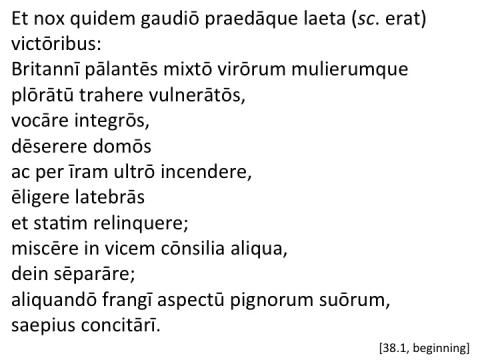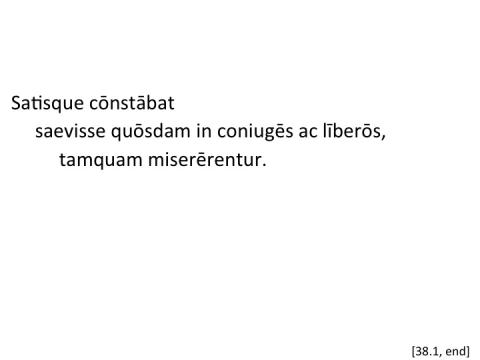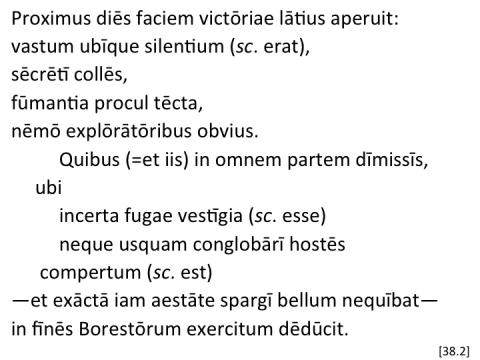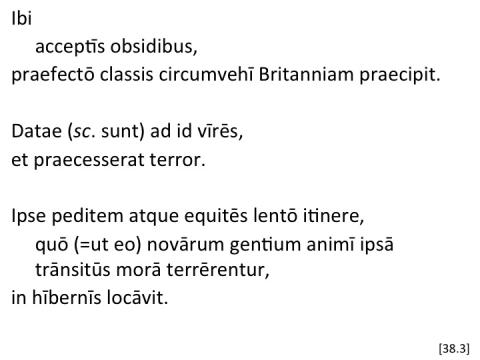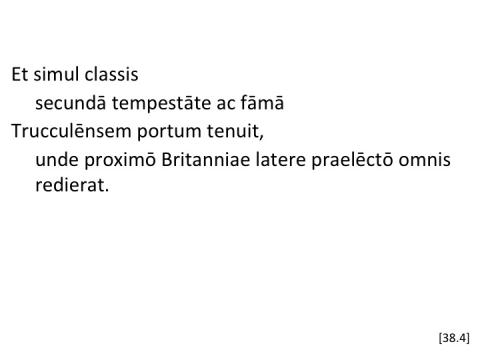Overview: The night after the battle; scenes on the day following; Agricola withdraws to the country of the Boresti; he sends the fleet on a voyage of exploration. (Stuart); this chapter begins on f. 63r of the codex Aesinas.
38.1
et ... quidem ... Britanni: the ellipsis of sed, extremely common in Tacitus, is especially so after et ... quidem. (Gudeman) nox quidem: sc. erat. (Damon); quidem by emphasizing marks a coming contrast, viz. with proximus dies. (Pearce) nox ... victōribus: i.e. the night was passed joyfully by the victors, owing to the soldiers' delight in their success and the resultant booty. (Gudeman) gaudiō: i.e. the joy of victory. (Pearce)
pālantēs: "in straggling bands." (Stuart); "separating," equivalent to rari, above, or disiectos (20.2), is a favorite term in Tacitus, and used of soldiers breaking their ranks. (Gudeman)
trahere, etc.: observe the accumulation of ten historical infinitives, and see note ch. 5.1. (Gudeman)
vocāre integrōs: i.e. shout orders to their unwounded comrades. (Pearce)
per īram: "in their wrath," equivalent, as very often in T., to a modal ablative. (Gudeman) [A&G 412]
ultrō: "actually going so far as to." (Gudeman)
miscēre = communicare, with the added sense of confusion. (Pearce)
invicem: here correctly used of change. See note on 6.1. (Pearce)
cōnsilia aliqua: "tentative plans," adopted only to be abandoned for others. (Stuart); "devising some plan or other." (Gudeman) aliqua: contemptuous; it expresses the diversity and futility of their plans. (Pearce)
sēparāre = separatim capere consilia, the usual method of barbarians, see note ch. 12.2. (Gudeman)
pignorum: "loved ones," a poetic term applied especially to children. (Stuart); "pledges" (of love), i.e. wives and children. (Pearce); "their dear ones." A poetic word for children, found repeatedly in Tacitus. (Gudeman)
satisque cōnstābat: a favorite phrase in Tacitus. The imperfect, for the present, takes the reader back to the report itself as given at the time by eye-witnesses of this scene, and thus prevents tamquam from being regarded as the subjective inference of the author, a usage not found in Tacitus. See note ch. 15.3. The Britons preferred to kill their wives and children rather than to see them led off into captivity with all the indignities which that involved. See ch. 15.3 and Germ. 8. (Gudeman)
saevisse: see chapter 2.4. (Stuart)
tamquam miserērentur: "in the thought that they were showing them compassion." (Stuart); tamquam is often used by Tacitus to denote not pretence, but the real point of view of the person acting ... . See 15.1, 3. (Pearce)
38.2
diēs faciem ... aperuit: see note on 22.1 annus aperuit, and 7.1. (Pearce); personifications of time and figurative uses of facies are common in Latin writers, but this particular metaphor seems to be a new coinage, and is found only here. (Gudeman)
vastum ubīque silentium: "a dreary and all-pervasive silence." (Stuart)
sēcrētī: this word, which regularly means remote, here passes into the meaning of lonely, deserted by man, loneliness being a natural accompaniment of seclusion. (Stuart) sēcrētī collēs: the epithet secreti was probably suggested by the thought of the Britons larking in the hills rather than by the secluded position of the hills themselves. See note on 29.2. (Pearce); "lonely, quiet," as being no longer occupied as before — a picturesque touch. ... Observe the fine cumulative effect of the asyndeton, giving the idea of weird desolation as far as the eye could reach. See Introd. p. xxvii #11.a. (Gudeman)
incerta: sc. esse, dependent on compertum and parallel to conglobari. (Damon); translate, "were lost." (Pearce) incerta fugae vestīgia: probably a reminiscence of Lucan 8.4, where the identical expression occurs. (Gudeman)
compertum: sc. est. (Damon)
et ... spargī bellum nequībat: "likewise operations could not be diffused through the country"; an independent sentence expressing an additional reason, as in chapter 10.4, et hiems adpetebat. (Stuart) et = et praeterea. See note ch. 11.2. (Gudeman) spargī bellum: "hostilities be spread over a large area." (Pearce); the poetical phrase occurs again, Ann. 3.21, and is taken from Lucan, 1.468, 2.682, 3.64, who in turn may have been influenced by Vergil's spargere arma in Aen. 7.551. (Gudeman)
Borestōrum: what we know of this tribe is confined to this reference. Evidently they were near the seacoast since Agricola was able to put himself in communication with the commander of the fleet. (Stuart); probably a Caledonian tribe southeast of the battle scene. They are mentioned only here. (Gudeman)
38.3
circumvehī Britanniam: the expedition referred to in chapter 10, from which we learn that circumvehi refers not to the whole island, but only to the northern coast. The fleet doubled John o' Groat's and sailed far enough down the western coast to establish the insular character of Britain. (Stuart); as we learn from this and the earlier passage, the fleet had been instructed to go only far enough to the north to catch a glimpse of Thule, and was then to sail directly south along the western coast. This plan was, however, thwarted by the advanced season of the year (ch. 10.4, et hiems adpetebat); so they returned to the point whence they started, meeting again with favorable weather on the homeward journey. The insularity of Britain had already been proved by the Usipi in the previous year (82 CE). See ch. 28. (Gudeman)
praecipit: with infinitive (instead of ut and subjunctive), as in 46.3. (Pearce)
vīrēs: "forces," with which to make descents on the coast, &c. For the results of this voyage see 10.5. (Pearce)
et praecesserat: et = "and moreover" (i.e. in addition to their actual fighting strength, they were helped by the terror of the Roman name). (Pearce)
lentō itinere: ablative of manner, somewhat loosely used with locavit. We should expect in hiberna reduxit or a kindred expression denoting motion toward. (Stuart) [A&G 412]; "by leisurely marches." (Gudeman)
novārum: "newly-discovered," or "newly-subdued." See 20.3, Britanniae nova pars. (Pearce)
in hībernīs: the exact location cannot be determined. If simul, etc., is to be taken strictly, these winter quarters must have been at some distance from the eastern shore, even allowing for the lento itinere. It is, therefore, probable that they ought to be located south of the Clyde, near the western coast, and on British, not Caledonian, territory. (Gudeman)
38.4
secundā tempestāte ac fāmā: "with favorable weather and great renown." On the apo koinou construction of secunda, see Introd. p. xxxii #8. (Gudeman) secundā: used in different senses with tempestate and fama in accordance with Tacitus' love of conciseness. (Pearce)
Trucculēnsem portum: probably, as the context seems to imply, on the east coast, near the Firth of Forth. The harbor is not elsewhere mentioned. (Gudeman)
tenuit: "cast anchor, reached port." A nautical phrase. (Gudeman)
unde: to be connected only with praelecto; from which (setting sail) it coasted along, etc. (Stuart); Tacitus, in trying to express himself concisely, combines two clauses qualifying Trucculensem portum: (1) unde ... latus legerat; and (2) quo ... redierat. But by contracting the first clause into the ablative absolute, he has only place for the first conjunction unde, and quo has to be mentally supplied as eo with redierat. (Pearce)
proximō ... latere: i.e. the east and north coasts. (Pearce) proximō: i.e. to the Romans on the continent, hence eastern. The distance between them was underestimated, and the relative positions misconceived. (Gudeman); the place referred to here is unclear, since we do not know where the fleet started its circumnavigation (see 10.4) or what direction it sailed. If the adjective does mean "closest to Rome" (see notes above), it might refer to what the Romans considered the southern "flank" of the island (see 10.2), as does proxima pars Britanniae at 14.1. The obscurity resulting from gaps in our knowledge and the compression of Tacitus' expression may have been compounded by textual corruption; the first emendations are visible on the manuscript itself (see the 10th line from the bottom of the left hand column). (Damon)
omnis: "in its entirety," i.e., without suffering losses along the way. This adjective regularly precedes its noun, so when it follows it, as here, it is emphatic. Some editors accept the correction recorded in the manuscript (see note above), omnī, which modifies latere: "the closest side, all of it." (Damon)
redierat: the pluperfect with reference to tenuit; the fleet put into the harbor and thus had returned to its point of departure. (Stuart); the pluperfect is noticeable. It must denote a time prior to tenuit. (Pearce)

